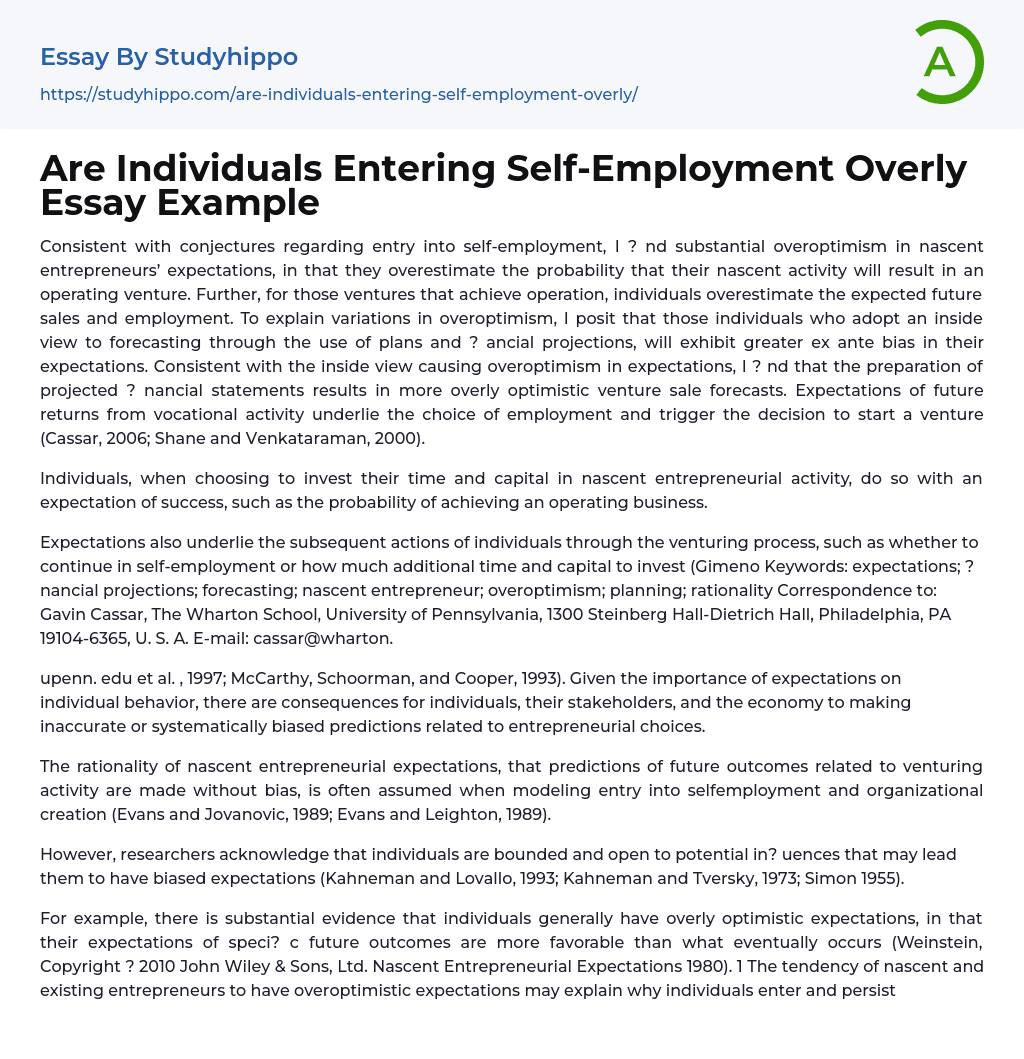

Are Individuals Entering Self-Employment Overly Essay Example
The probability of a successful venture is often overestimated by nascent entrepreneurs, who also tend to overestimate future sales and employment. Those who take an inside view, relying on financial projections and plans, are more likely to exhibit bias in their expectations. Indeed, preparation of projected financial statements results in even greater overoptimism regarding venture sale forecasts. Ultimately, expectations of future returns from vocational activity guide employment choices and trigger decisions to start a venture.Nascent entrepreneurial expectations are important for individual behavior, stakeholders, and the economy. Inaccurate or biased predictions related to entrepreneurial choices can have significant consequences. The assumption that predictions of future outcomes related to venturing activity are made without bias is often used when modeling entry into self-employment and organizational creation. However, researchers acknowledge that individuals may have biased expectations due to po
...tential influences. People generally have overly optimistic expectations, with their expectations of future outcomes being more favorable than actual outcomes. (Evans and Jovanovic, 1989; Evans and Leighton, 1989; Kahneman and Lovallo, 1993; Kahneman and Tversky, 1973; McCarthy, Schoorman, and Cooper, 1993; Simon, 1955; Weinstein, 1980). If you need to contact the author Gavin Cassar, The Wharton School, University of Pennsylvania, you can do so by emailing [email protected] or sending mail to 1300 Steinberg Hall-Dietrich Hall, Philadelphia, PA 19104-6365 in the United States of America.The existence of overoptimistic expectations among new and established entrepreneurs might be the reason why people choose to pursue self-employment, despite the possibility of lower returns from their ventures (Camerer and Lovallo, 1999; Moskowitz and Vissing-Jorgensen, 2002). Despite some theories about the level of overoptimism among those starting or continuing with self-employment, surprisingly, there is little proo
regarding the logic behind entrepreneurial expectations. Specifically, no research has studied how initial expectations of those entering self-employment - known as nascent entrepreneurs - match up with the actual results post-launch. For example, whether they have created a functioning business, made adequate sales, or achieved satisfactory returns from self-employment. Therefore, our comprehension of entrepreneurial expectations and entry is limited. To close this gap of knowledge, the rationality of nascent entrepreneurs' expectations - individuals currently engaged in starting a business - is examined with data from the Panel Study of Entrepreneurial Dynamics (PSED). One unique feature of PSED is that it identifies and surveys nascent entrepreneurs while in the start-up process, mitigating any survivorship or recall bias that might arise from surveying established entrepreneurs (Gartner et al.2004).The PSED conducts a longitudinal survey of individuals engaging in nascent venture activity to compare ex ante expectations with ex post realizations. This overcomes the use of perceptual measures of predictions or outcomes, and provides a powerful sample for investigating overoptimism because of the high uncertainty of the forecasting task and increased cognitive bias amongst entrepreneurs. The study examines the influence of plans and projections used by entrepreneurs on differences in overoptimism. Theoretical economic models explicitly model optimistic or overconfident individuals entering into self-employment, consistent with observed overoptimism. While comprehensive and detailed information analysis is generally considered beneficial when formulating expectations, some information acquisition and use may be ineffective in dampening, or may potentially exacerbate the overoptimistic tendencies of individuals. Authors such as Armor and Taylor, Kahneman and Lovallo, and Zacharakis and Shepherd suggest this.Through this article, I contend that the overconfidence of nascent entrepreneurs can be attributed to their
adoption of an 'inside view' approach to forecasting. The inside view entails focusing on the specific details of the plan, considering obstacles and constructing scenarios of future progress, which leads to the tendency to generate overoptimistic forecasts. Researchers have established that individuals prefer the inside view. This view also leads to the planning fallacy, which fixates decision-makers on the particularities of a problem rather than outcomes from similar situations or base information. As a result, individuals tend to approach their projects with unwarranted confidence despite knowledge of similar ventures having failed before. I have noticed that nascent entrepreneurs tend to be overoptimistic in their expectations and overestimate the likelihood of successfully launching their business. Furthermore, those who do launch often exaggerate future sales and revenue during the first year.
It can be observed that individuals who enter self-employment with an optimistic mindset tend to achieve positive results. Additionally, there is a correlation between formal business planning and individuals having higher expectations of establishing and running a business through their start-up activity. This view appears rational, as formal business planning also increases the probability of successfully creating and operating a business.
- Entrepreneur essays
- Walt Disney essays
- Henry Ford essays
- Bernie Madoff essays
- Rockefeller essays
- Bill Gates essays
- Steve Jobs essays
- Animals essays
- Charles Darwin essays
- Agriculture essays
- Archaeology essays
- Moon essays
- Space Exploration essays
- Sun essays
- Universe essays
- Birds essays
- Horse essays
- Bear essays
- Butterfly essays
- Cat essays
- Dolphin essays
- Monkey essays
- Tiger essays
- Whale essays
- Lion essays
- Elephant essays
- Mythology essays
- Time Travel essays
- Discovery essays
- Thomas Edison essays
- Linguistics essays
- Journal essays
- Chemistry essays
- Biology essays
- Physics essays
- Seismology essays
- Reaction Rate essays
- Roman Numerals essays
- Scientific Method essays
- Mineralogy essays
- Plate Tectonics essays
- Logic essays
- Genetics essays
- Albert einstein essays
- Stars essays
- Venus essays
- Mars essays
- Evolution essays
- Human Evolution essays
- Noam Chomsky essays



